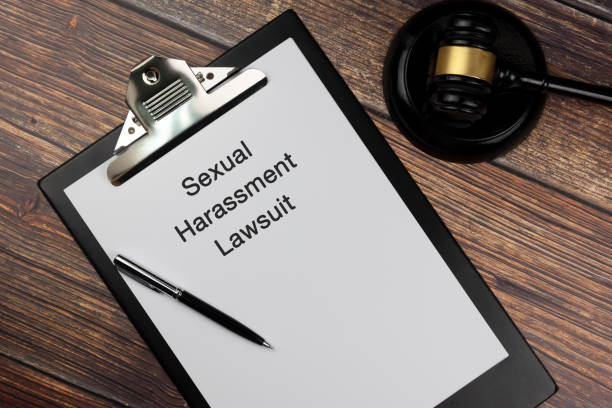
Derogatory comments are always wrong
Derogatory comments are typically said to be disrespectful and insult the recipient. They are not automatically assumed to be sexual in nature, as they can be targeting race or appearance with no sexual connotation. However, when there are derogatory comments regarding gender, then there is most likely overlap with comments of sexual harassment.
Comments regarding gender are more likely to be sexual or suggestive in nature, and can constitute both sexual harassment and sex discrimination. And are usually the easiest to identify. This article will explain the difference, discuss what to do if you are a victim of derogatory comments and/or sexual harassment, and outline some real life examples.
Under the Sex Discimination Act 1984, the test for whether an act or comment constitutes sexual harassment includes three elements. Whether their behaviour was unwelcome, whether it was sexual in nature, and whether a reasonable person could predict that the behaviour would offend, humiliate and/or intimidate the recipient.
Therefore, not all derogatory comments will constitute sexual harassment as it is dependent on whether there was a sexual or suggestive element. Furthermore, as the definition implies, there is no requirement for sexual harassment to include a physical component or intentional. Purely sexual commentary, even only said once, can constitute sexual harassment.

Are you a victim of sexual harassment or derogatory comments?
Under Fair Work law all employees have the right to complain regarding a workplace matter. If you are a victim of derogatory comments, whether sexual or not, then it is imperative you complain and inform a member of staff who has authority.
Typically a manager, an owner, or directly to Human Resources. With authority the staff member will have the ability to escalate the matter to the necessary people within the company, whether Human Resources or otherwise.
If no one in your workplace knows that something wrong is happening then there is no opportunity for change and it is likely for the derogatory behaviour to continue. With any serious complaint the Company or Human Resources (if applicable) are required to investigate. To ignore the matter is a serious infringement on employee workplace rights.
If the derogatory comments are not sexual in nature then they may still constitute bullying or discrimination. You can contact us for free advice if you are not sure or need help.

Derogatory posters forces employee to resign
In the case of Yelda v Sydney Water Corporation, Ms Yelda was an employee of Sydney Water Corporation, a predominantly male workplace, as a customer liaison officer since 2004. Sydney Water had contracted Vitality Works to create a campaign about spine safety within the company.
In late 2015, Ms Yelda was called to work on a leak in a residential home. This is where she met the employee from Vitality Works working on the Safe Spine Campaign. Ms Yelda agreed to have her picture taken for the purposes of the campaign.
The design of the poster shows Ms Yelda smiling and standing with her left arm in the air and pointing to a large text above her stating “Feel great – Lubricate”. The word ‘lubricate’ is the largest and thickest text on the poster, and paired with an exclamation mark. The poster was placed outside the mens toilets and lunchroom on the advice of Vitality Works. Ms Yelda was not informed prior what the contents of the poster would contain.
Ms Yelda was humiliated and felt like a ‘sex object’. She filed a claim of sexual harassment against Vitality Works and Sydney Water in the NSW Civil and Administrative Tribunal (NWSCAT) under the Anti-Discrimination Act 1977 (NSW).
Ms Yelda resigned shortly after placing her complaint as she was too embarrassed to go to work. The Tribunal agreed with Ms Yelda that the posters were suggestive and did constitute sexual harassment under s 22A. Ms Yelda was awarded $100,000 from both Vitality Works and Sydney Water, amounting to a total settlement of $200,000.

How did an employee win big?
The word ‘lubricate’ was found to not be relevant to spinal health and did not connote that message. However, it had a sexual connotation. Furthermore, Ms Yelda, a female, was the only person in the poster and not one of her male co-workers. The Tribunal found that this was a form of discrimination based on her sex.
This case highlights a number of factors relevant to derogatory comments. Firstly, that written comments can constitute sexual harassment and does not require a physical or verbal component. Furthermore, the Vitality Works employee did not have to have the intention to be derogatory and make the Applicant feel disrespected.
The fact that she was, and a reasonable person would feel a similar way, is enough to bring a claim forward. Other factors that supported Ms Yelda was the fact that she was singled out in a large workforce of male coworkers, and had voiced her complaint to make a change.
Derogatory comments affects employee’s mental health
Being subject to derogatory comments can have a significant effect on an employee’s mental health. As seen in Mary Adams v Simon Blackwood. Ms Mary Adams filed for worker’s compensation after being harassed by her Manager, Mr Lance Hippisley. Her claim was rejected, in which Ms Adams filed for an appeal in the Queensland Industrial Relations Commission (QIRC).
Ms Adams was an Enrolled Nurse with Healthscope Ltd at the Allamanda Private Hospital (the Hospital). Originally working in the endoscopy unit of the surgical centre, Ms Adams moved to a position of the Central Sterilising Department (CSD). She was there from 2008 until 2011.
Ms Adams and Mr Hippisley would work together for approximately 30 minutes at a time. A significant issue was Mr Hippisley’s use of profanity and derogatory comments towards female staff. Mr Hippisley would bully Ms Adams and other staff, often making comments that were sexual in nature towards female staff and shouting personal remarks.

Employer does not get away with sexual harassment
It was undisputed that Mr Hippisley would use the swear ‘fuck’, however not entirely directed at a single individual. Furthermore, commonly saying the phrase “bang it up your freckle”. Mr Hippisely agreed that he would make derogatory comments under his breath and make jokes containing sexual innuendo and foul language, but denied any directed at Ms Adams or another female coworker.
Mr Hippisely was frank in his submissions. Agreeing that he commonly made derogatory comments and would make inappropriate jokes. However, he entirely denied a number of allegations.
Another component includes Ms Adams’ partner making a complaint to the Hospital on her behalf against Mr Hippisely. He made an anonymous call in order to inform the General Manager of the inappropriate, sexual, and derogatory comments that his partner would face at work. Mr Hippisely was called into the office and talked to however no investigation had taken place.
Mr Hippisely confessed that he swore, however that was ‘commonplace’ in the industry. He came out of the office complaining that “some asshole had placed a complaint [against him]”. Clearly not having been reprimanded. Again, three weeks later Ms Adam’s partner placed an anonymous complaint. Disappointed at the lack of initiative or care from the Hospital.
The Industrial Relations Commission supports employees
The Regulator was not convinced of all of Ms Adam’s evidence, however considering that Mr Hippisely on his own admission agreed he had made derogatory comments, they were satisfied that she was offended.
Ms Adam’s had an appropriate reaction to what was found to be true and that she worked in an uncomfortable environment. Mr Hippisely comments, at times, did constitute sexual harassment. And it was his responsibility as manager to ensure that there were safe and respectful working conditions.
The Regulator supported that Ms Adam’s had medical evidence to prove that Mr Hippisely’s actions exacerbated her illnesses. No singular event was supported, however in Mr Hippisely’s attitude as an entirety he had made a sexual, unpleasant, and uncomfortable working environment. Ultimately, the Regulator found that Ms Adams’ claim should be accepted and continued throughout the worker’s combination process.
This case highlights a commonplace scenario where entitled people feel as though they can disregard other employee’s feelings for the sake of their comment. No court, tribunal, or commission would allow derogatory, uncomfortable, or sexually explicit comments to exist in the workplace if given the opportunity to prevent further behaviour.
Furthermore, were Ms Adams to complain herself to the General Manager, there may have been a greater opportunity to investigate or prevent disgusting comments. It was agreed that only so much can be done through an anonymous caller outside the workplace.
While the Hospital could have been more proactive, it takes action to create change for the common good. Therefore, never feel afraid to speak up on inappropriate behaviour.

65 year old employee faces derogatory comments
In the case of Casey v Flanagan [2011] QCAT 320, Ms Gladys Casey was a 65 year old lady from former Yugoslavia working for the security industry and worked for UHF/CB Radio, Channel 7. Ms Casey claimed that the owner, Mr Paul Flanagan, had made derogatory comments which constituted sexual harassment against her.
These comments include ‘wog’, ‘dago’, ‘truckie slut’ and ‘crack whore’, said over the CB Radio. Furthermore, during this time Mr Flanagan was subject to a Peace and Good Behaviour Order due to an order request that Ms Casey made herself. Where Ms Casey’s most recent allegations directly opposed his Order requirements.
Ms Casey alleged that as a retort for placing Ms Flanagan on a Behaviour Order, Mr Flanagan helped broadcast her address so that people would go to her house asking for sex. Her address was placed in a BP truck station in Archerfield, and a friend of Mr Flanagan broadcasted her address on the radio.
Both for the purpose of strangers going to her house asking for sex. Sexually harassing Ms Casey and racially vilifying her.
Furthermore, pictures and videos would be taken of Ms Casey that would be posted to the radio website. She continues to get calls from strangers asking for sex. Fortunately, Ms Casey had video proof of Mr Flanagan and friends making derogatory and sexual comments.

Justice prevails for employee
One defence was that similar behaviour was a part of the team’s culture. Sometimes comments and actions were funny and at times aggressive. Employees would regularly laugh and engage with this type of behaviour.
Furthermore, listeners would purposefully tune in to listen to that type of behaviour as it was not radio norm. However, while some may accept this culture, that does not mean it should be forced upon people who do not want to participate.
With the help of testimonies and evidence the Tribunal had supported Ms Casey in that she was sexually harassed and racially vilified by Mr Flanagan. Ms Casey was severely ridiculed by Mr Flanagan with the intention to humiliate, intimidate and embarrass her. Furthermore, it was supported that Mr Flanagan had encouraged others to exhibit similar behaviour.
Ms Casey was awarded $5,000.00 in compensation for her pain and suffering as she experienced unlawful discrimination. Ms Casey had no proof of medical costs and was financially supported through work cover, therefore could not claim loss of wages.
Key take aways to avoid derogatory comments

The three cases above highlight how derogatory comments and sexual harassment can overlap and exit simultaneously. Not all derogatory comments will automatically be sexual in nature, and not all sexual harassment matters will include sexualised commentary.
If you feel like a victim, or know someone who is facing similar issues please contact us. For any advice or any safety assurance, Sexual Harassment Australia is the right place to be contacted. Before it is too late, drop a query in the chat box and reach out to the team.
They have helped many victims, made people regain their faith in themselves and improvised the well-being of many people. So, reach out to the team and relax as they hold your back. We have achieved considerable settlements in sexual harassments claims to the AHRC and state based Equal Opportunity bodies. Please note that we are not lawyers but paid agents that are motivated to help victims nation wide.
Call 1800 333 666 for free confidential advice.













